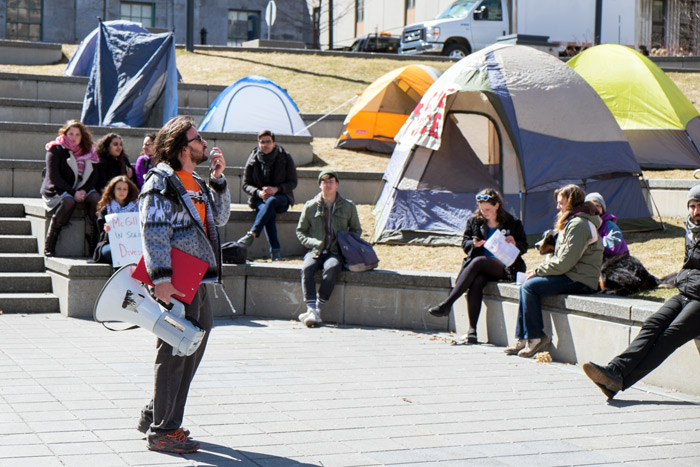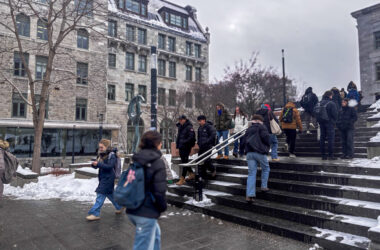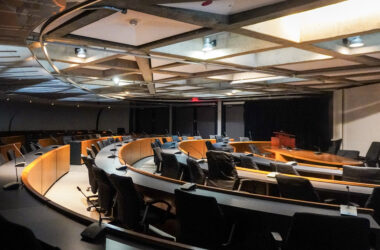On March 23, Principal Suzanne Fortier sent an email to the McGill student body announcing that the Board of Governors (BoG) had decided not to divest from McGill’s holdings in fossil fuel companies. Divest McGill first submitted a call to divest from fossil fuels to the Committee to Advise on Matters of Social Responsibility (CAMSR) in Feb 2015. CAMSR took over a year to make their decision, finally delivering their report to the BoG on March 17.
The final CAMSR report on divestment thanked Divest McGill for bringing the issue of climate change to attention at McGill, but stated that CAMSR and Divest McGill hold different views on the role that extractive industries play.
“The Committee is persuaded that the beneficial impact of fossil fuel companies offsets or outweighs injurious impact at this time,” CAMSR’s report stated.
The report outlined that they had not found the actions of fossil fuel companies to cause social injury, despite the case presented by Divest McGill.
“Continuing to explore or refusing to keep unburnable reserves underground does not directly have grave injurious impact on individuals or the natural environment,” the report stated. “Climate change is an injurious impact primarily due to the burning of fossil fuels by end-users rather than activities of fossil fuel companies.”
Jed Lenetsky, U1 Environment and member of Divest McGill, said that the BoG did not properly examine the harm being done by fossil fuel companies.
“The fact that they didn’t even consider extreme extraction as social injury was a serious affront to people who are being directly affected by irresponsible extraction methods every day,” Lenetsky said. “They also claimed that climate change shouldn’t be considered social injury because it hasn’t yet reached grave levels. Hundreds of thousands of people dying every year, and more being displaced across the world because of climate change, seems pretty dire to us.”
Mike Andrew, president of the Co-op Mining Engineering Undergraduate Society (CMEUS) explained that the society supports McGill’s decision to not divest.
“Many students in the program obtain internships and post graduation positions at fossil fuel companies,” he said. “CMEUS [… is] committed to ensuring the stability of Canada’s energy future in a safe and sustainable manner. Collectively, we understand the importance of transitioning to a carbon neutral economy in the face of climate change. That being said, fossil fuel companies are among the largest investors in the green energy technology that is needed for this transition.”
CAMSR explained how divestment would not be an impactful movement against climate change.
“Divestment, whether to exert financial influence or for symbolic purposes, would not be an effective means of addressing climate change,” the report reads. “It is an ultimate action that is disconnected from the intended outcome of reducing the injurious impact represented by climate change. It also is a distraction to efficacious forms of action, and somewhat overreaching relative to reasonable next steps given the current economic and political reality. The Committee sees no advantage or benefit for McGill to engage in action that would have negligible impact on climate change.”
Students’ Society of McGill University (SSMU) Vice-President (VP) External Affairs Emily Boytinck stated that the BoG and CAMSR did not allow McGill students to be a part of the decision process.
“All CAMSR meetings were held in closed sessions, and the final report was released to the board only 26 hours before it was voted on,” Boytinck said. “Furthermore, the BoG never once heard from Divest McGill directly, despite the fact that Divest McGill attended every board meeting as observers this year.”
Although he did not respond to a request for comment, Chair of the BoG, Stuart “Kip” Cobbett was closely involved in the deliberation process.
“Earlier in the year, a few members of Divest McGill met with Kip Cobbett and Michael Di Grappa, [vice-principal Administration and Finance], to discuss the idea of releasing a draft report before it was voted on at the [BoG],” Boytinck said. “This way, there could be feedback provided on the report and community voices would be able to be heard. This is not uncommon practice, as Dalhousie released a draft report initially as well. Kip Cobbett, however, responded by noting that this was not a conversation.”
Kareem Ibrahim, SSMU president and member of theBoG, stated that an increase in transparency would benefit any future decisions regarding divestment.
“Although the University followed its procedures appropriately, we would certainly appreciate a more open process next time, as exists in many other comparable universities,” Ibrahim said. “This would require some changes to our governance procedures, but in the spirit of transparent and two-way dialogue, I don’t think this would be an issue.”
The choice not to divest left many students frustrated with the university and the lack of consideration for student voices.
“The decision by members of the Board to maintain McGill’s investments in fossil fuels is disappointing and embarrassing to say the least,” Lenetsky said. “Not only does their decision signal their inability to lead on issues of great importance to all of humankind, it also demonstrates how disconnected they are from the McGill community. They were the first body at McGill to reject divestment, and did so after refusing to conduct community consultation or provide a draft report for community comment. They didn’t even have the courtesy to inform us of the vote.”
Although there are not yet any formal plans to present the case for divestment again, Doug Sweet, director of the McGill’s Media Relations Office, indicated that the BoG could revisit divestment in the future.
“CAMSR has finished its work on this file,” Sweet wrote in an email to the Tribune. “If and when another request is made, it will re-engage.”
Lenetsky noted that this is not the last time that Divest McGill will petition the University.
“This is not the end of our campaign by any means,” he said. “If anything, the Board’s ridiculous report is galvanizing further support and action for divestment. We simply care too much to let our university continue to be on the wrong side of history.”
On Tuesday March 29, Divest McGill began a sit-in in front of the James Administration Building. According to the event’s Facebook page, sit-in participants are prepared to stay until all demands are met.









Pingback: Divestment Facts
Pingback: Divest from damage and invest in a healthier future | Revelstoke Mountaineer
Pingback: Divest from damage and invest in a healthier future - KamloopsCity.com